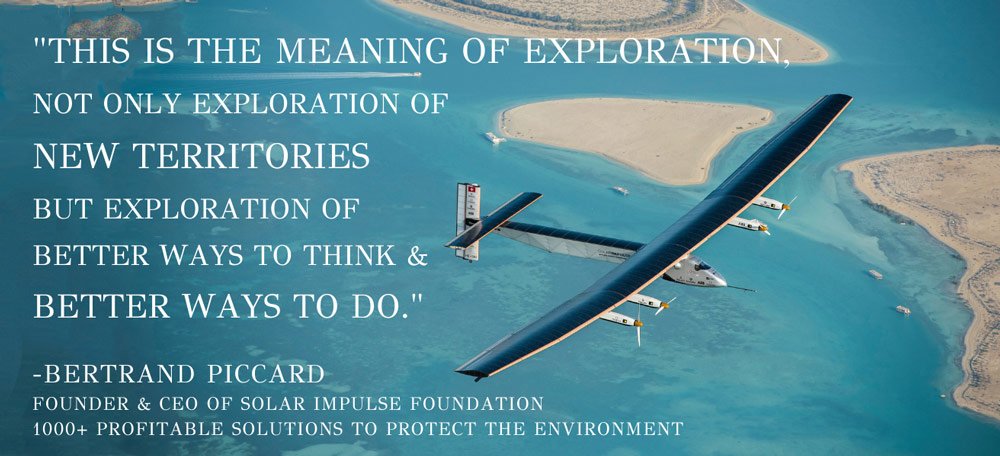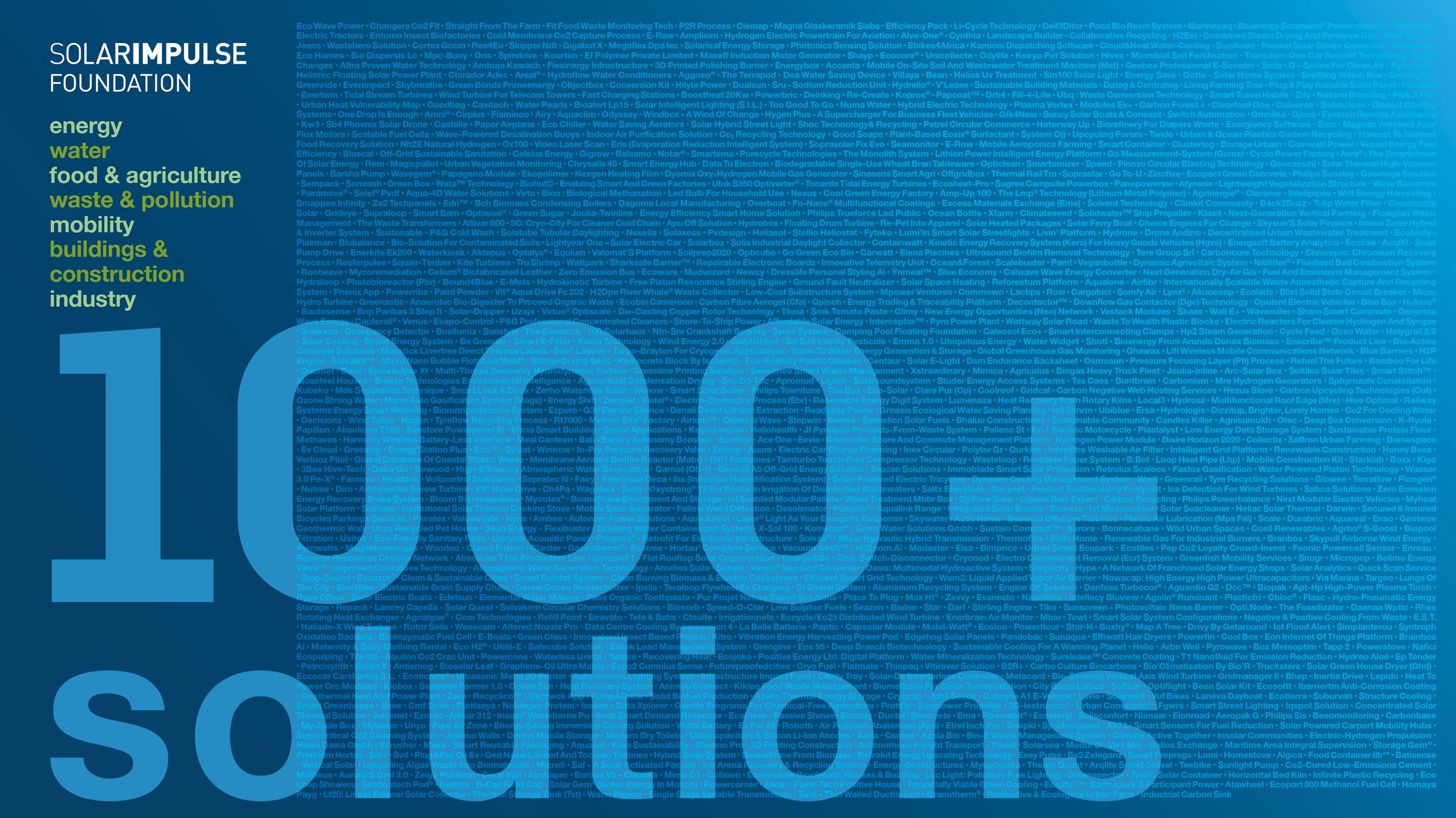Psychiatrist, aviator and explorer, Bertrand Piccard made history in 1999 by accomplishing the first ever non-stop round-the-world balloon flight, and a number of years later the first round-the-world solar-powered flight. Piccard has dedicated his life to demonstrating sustainable development opportunities. He is Founder and Chairman of the Solar Impulse Foundation, which has assembled a verified portfolio of over 1400 actionable and profitable climate solutions. As a pioneer of new ways of thinking that reconcile ecology and economy, he uses his exploration feats to motivate governments and industries to take action. He is a United Nations Goodwill Ambassador for the Environment and Special Advisor to the European Commission. He’s author of Réaliste, Changer d’Altitude, and other books.
BERTRAND PICCARD
I could speak about it forever and tell you all the beautiful things I've seen, but it will be useless because people are not going to protect the environment because the environment is beautiful. People are going to protect the environment if it is profitable to do it. It's terrible what I'm saying, but it's the truth. It's what people think. If you have industry, the economy producing goods for the entire world and all the people who consume them, they're not going to stop because it's beautiful to see a lake in the mountain or birds on the river or nice fish jumping in the sea or in lakes. They're going to do it if it's profitable.
So, of course, I'm an explorer. I love the beauty of the world. I've seen fantastic things like the Delta of the Ganges River in the Bay of Bengal in moonlight. I've seen deserts with the dunes, with the rocks and the sunrise with my solar-powered airplane. I've flown above oceans where there were whales jumping in the water and big bunches of dolphins when I was flying with Solar Impulse. It's beautiful, but it's not enough to motivate people. You know, at the end of a speech, if I speak about that for an hour, people will applaud, standing ovation. Great! And what? They go back home. Are they going to change their habits? If it's a CEO of a company, is he going to be more energy efficient? No, I don't think so.
So this is why I prefer to speak with really down to earth language. So maybe the people who love nature are going to say, “Oh, Bertrand Piccard, now he is too down to earth. He's speaking about profitable solutions. He's speaking to the industries that are polluting,” but we have to speak to the industries that are polluting and bring them profitable solutions, otherwise the world will never change, or humankind will never change. And don't forget one thing, what we are damaging is not the beauty of nature. What is being damaged is the quality of life of human beings on Earth because we can still have beautiful things to see, but if we have climate change, if we have tropical disease in Europe, if we have heat waves, floods, droughts, millions of climate refugees, life will be miserable, even if nature is still beautiful.
*
1000+ Actionable & Profitable Climate Solutions
All the holders of solutions, all the innovators could be a startup or a big company, can submit their solution to us, and the solution will be analyzed by our group of experts. We have external and independent experts, about 370 of them, and they will observe three criteria: Is it a solution that exists today and is credible today? Because we don't want to have vague ideas for the future. We want to have solutions for today. Then it needs to be economically profitable for the company who produces it and for the consumer. The people buying the solution must save money, otherwise it's not profitable. And it needs to protect the environment, either because it's much better than anything else existing today, or because it's clearly a new business opportunity to protect the environment.
If you have these criteria that are all three positive, then the experts will give a recommendation that we give the label, and then they will receive the label. The Solar Impulse Efficient Solution Label is currently the first and only label in the world that certifies the profitability of an environmentally friendly product.
*
If you look at the energy that is produced, where does it go? It is transported, and you have a lot of losses, then it goes into energy systems that have a lot of losses. And at the end, three quarters is lost. Just take the thermal engine of your car, the maximum return that you can have is about 25 to 27%, when the engine is warm, constant RPM. If you accelerate, it's even worse. It means that when you pay 2.20 euros for the fuel in your tank, three quarters of it is lost by friction, heat, and so on.
It's horrible. For food, it's about half of it that is lost between production and consumption. The waste – it's 95% that is wasted because people don't understand it's a resource. So, each time you are more efficient because you have a new system that allows you sometimes just with common sense, and that's high-tech that allows you to save energy or natural resources, you would be more profitable and more ecological.
With Climate Change the Laws Must Change
Once we passed the bar of 1,000 solutions available today, profitable today, protecting the environment today, I thought everybody is going to use them. Fantastic, we have finished our job! No. Not because, of course, a lot of people don't know about these solutions, but also because the legal framework is an obstacle for these solutions. You know, today the legal framework still allows you to pollute legally, to put as much CO2 as you want in the atmosphere, as much plastic in the oceans. It's not forbidden. So you have so many corporations who are accused of being polluters, and they say, "We are legal. We respect the norms. We are respect the standards", and this has to change. Now we have to bring the legal framework to such a modernization that it can match the modernized solutions that we have, not just prohibiting some behaviors, but allowing these solutions to really make it to the market.
ONE PLANET PODCAST - THE CREATIVE PROCESS
Just go into some of those 50 propositions that you've put to the Assemblée nationale.
BERTRAND PICCARD
Well, we had to make a choice and start with fifty because even if there are 200 that are good, we cannot make 200 recommendations at once, then the parliamentarians would say, "Well, how should we start?" So we took 50 of them that have high leverage, easy to understand, and we had a law firm who prepared a proposition of regulation for each one. For example, there is a system of public lighting that is autonomous with a LED lamp, small battery, and solar cells. Can you imagine that if you had this in a city, the city would save up to 37% of its energy costs, but today the allowance for innovative solutions is very small in the public procurements. And this is one recommendation that we're asking.
*
On Spirituality, Exploration & Embracing the Unknown
If we have this vision of life, then we find meaning, but if everything is just the quest for temporary happiness, we are running after happiness all the time, we try to find it outside of ourselves, and it's difficult to find it outside of ourselves. And then we have depression, we have anxiety because we don't find what we want in life... I also would like to tell you how inspired I was in my childhood by all the big explorers that I met, astronauts of the early American Space Program, pioneers in aviation, pioneers in environment, in underwater exploration. And all these people showed me that it is wonderful to embrace the unknown, to do things that nobody thinks is possible, to try things for the first time, to invent, to create, to call our certitudes into question, to challenge our knowledge and try to know more and better and differently.
All this, I believe, is really important in life. Always try to improve what we see and what we have. This is the meaning of exploration, not only exploration of new territories, but exploration of better ways to think and better ways to do.
Photo credit: Jean Revillard
Cairo, Egypt, July 13, 2016 - Solar Impulse flying over the Pyramids
This interview was conducted by Mia Funk and Eveline Mol with the participation of collaborating universities and students. Associate Interviews Producer on this podcast was Eveline Mol. Digital Media Coordinators are Jacob A. Preisler and Megan Hegenbarth.
Mia Funk is an artist, interviewer and founder of The Creative Process & One Planet Podcast (Conversations about Climate Change & Environmental Solutions).
















































































